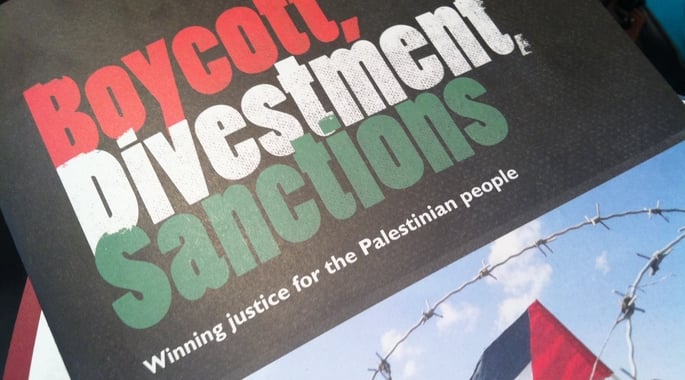U.S. Politicians Attempt to Sabotage BDS Anti-Occupation Campaign against Israel

In a recent national movement, U.S. state and federal politicians are attempting to stop an international pro-Palestinian divestment campaign from gaining momentum. The campaign, called Boycott, Divest and Sanction (BDS), hopes to inflict an economic cost on Israel for its continued occupation and the associated harm to Palestinians. Rather than defending what is ostensibly a peaceful country, the effort to “boycott the boycotters” once again draws attention to the moral bankruptcy of many of Israel’s leaders and their allies in the United States, and does nothing to bring peace to the two populations.
In a first step, South Carolina recently became the first state in the U.S. to enact legislation with the goal of fighting the BDS campaign. Under the legislation, all public entities in the state are prohibited from doing business with anyone who supports a boycott of any of the state’s trading partners. [1] A total of nineteen other states now hope to follow in South Carolina’s footsteps and enact similar legislation.
As supporters of BDS point out, however, the actions of U.S. politicians to counter the movement merely exposes their anxiety about its potential. As the Palestinian ambassador to the UN, Riyad H. Mansour, has said, “No matter what [Israeli Prime Minister Benjamin] Netanyahu says by trying to divert discussion to attack this group, that cannot cover the fact that his government is involved in illegal activities in the occupied territories, especially in settlements. It cannot be defended, including by legislators in the United States of America.” [1]
Indeed, it is increasingly difficult to defend a country that is continually implicated in serious violations of international human rights and humanitarian law [2], and whose presence within the Palestinian territories is officially recognized by the majority of the international community—including the International Court of Justice [3]—as a military occupation.
The U.S. Ambassador to Israel, Dan Shapiro, acknowledges that BDS and similar campaigns thrive most easily in the current environment of hostility and stagnation in the peace process. “Negotiations,” he says, “have always been the most effective tool to defeat all of these efforts….If there are no negotiations now, and most of the world does not believe that there will be any time soon, how can we still, first of all, fight against boycotts and sanctions and delegitimization, and how can we preserve the two-state solution as a realistic option?” [4]
Leaders of the BDS campaign compare it to the divestment campaign used in the case of South Africa during the era of apartheid. Many believe that the effort contributed to the ultimate breakdown of that system, and has the same potential in the case of Israel’s occupation.
Interestingly, in a 1999 study, Ivo Welch and C. Paul Wazzan showed that divestment in South Africa had no substantial impact on banks’ and corporations’ valuations, but still had the important effect of raising awareness. “The sanctions,” they said, “may have been effective in raising the public moral standards or public awareness of South African repression, but it appears that financial markets managed to avoid the brunt of the sanctions.” [5] Nelson Mandela, however, has said that divestment was a crucial factor in ending apartheid. [6] Divestment’s true value lies in its ability to reflect, and also generate, public opposition to systematic injustices. In this sense, divestment in South Africa was successful and may now prove useful in the case of Israel.
While divestment itself, and the BDS campaign, may not be the ultimate answer in effecting an about-face in Israel-Palestinian relations, its increasing prominence can serve as part of a broader strategy forcing a reexamination of the issues at play. Sooner rather than later, relations between the two sides are going to come to a head and require a concrete resolution, and actions such as BDS make an eventual peaceful compromise more likely than a replay of large-scale conflict as was witnessed last year.
Bryce White is an independent geopolitical analyst and student of political science residing in San Diego, and writes at warandbryce.wordpress.com.
Notes
[1] Gladstone, Rick. “Israel’s Allies in U.S. Challenge Boycott.” The New York Times. The New York Times Company, 05 June 2015. Web. 07 June 2015.Gladstone, Rick. “Israel’s Allies in U.S. Challenge Boycott.” The New York Times. The New York Times Company, 05 June 2015. Web. 07 June 2015.
[2] “World Report 2013: Israel/Palestine.” Human Rights Watch. Human Rights Watch, n.d. Web. 07 June 2015.
[3] “Legal Consequences of the Construction of a Wall in the Occupied Palestinian Territory.” International Court of Justice. International Court of Justice, n.d. Web. 07 June 2015.
[4] “US Envoy Shapiro: Difficult to Fight Boycott of Israel While Peace Process Frozen.” The Jerusalem Post. Jpost Inc., 4 June 2015. Web. 07 June 2015.
[5] Hendey, Eric. “Does Divestment Work?” Harvard University Institute of Politics. The President and Fellows of Harvard College, n.d. Web. 07 June 2015.
[6] Simmons, Adele. “Outside Opinion: Skeptics Were Wrong; South Africa Divestment Worked.” Chicago Tribune. Chicago Tribune, 15 Dec. 2013. Web.07 June 2015.


